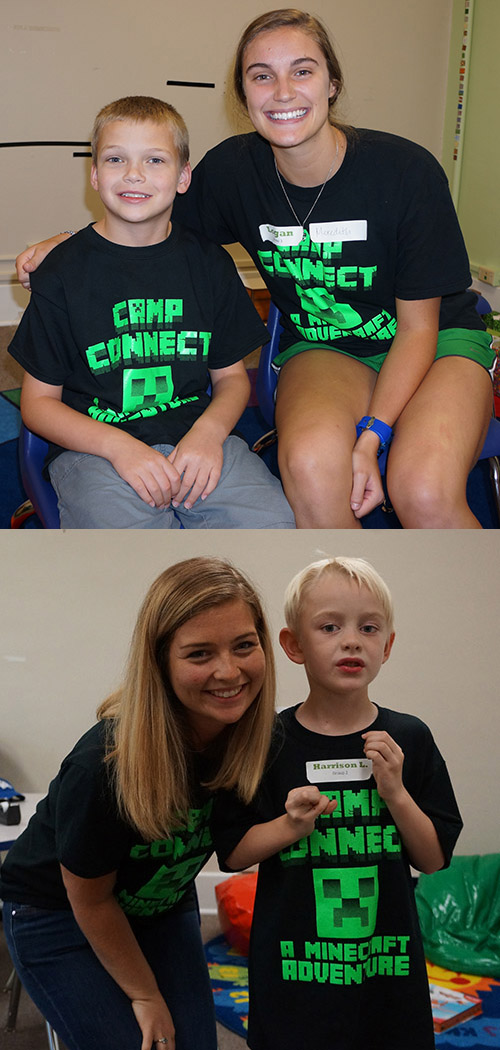
When families of children with autism find educators who understand their children and can help them, they hang on tight to those connections.
"When you get the diagnosis (of autism), first you get over the shock, then you start educating yourself and you keep educating yourself and others," said Sarah Davenport of Springdale. Her son, Logan, 8, recently attended Camp Connect at the University of Arkansas. "Anytime you find something new, you try it. Here, you don't have to spend days explaining about a child with autism. The other people, the parents, the kids, understand it here."
John Lee of Centerton said his son, Harry, 7, sometimes has trouble fitting in. Some activities at camps and afterschool activities he can do but not easily or the way other children do them, Lee said.
"When you have a special-needs child, it's not easy to find activities you feel comfortable putting them in during the summer," Lee said. "So, when you find people you like and who work well with your kids, you hold on to them. This group has peers and people who understand your child's foibles, who understand why he does what he does. When you find that, you don't want to let it go. Continuity is important for kids with autism."
Davenport agreed.
"You drive that extra distance," she said. "You wait in the parking lot."
Logan and Harry were two of 20 children, half with autism and half without autism, who attended Camp Connect the week of July 20. A similar session for older children was held the week before.
College of Education and Health Professions faculty and graduate students in the special education program who are studying applied behavior analysis worked closely with the children with autism. Applied behavior analysis is characterized by first understanding why problem behavior occurs and basing treatment on that understanding. Each of the children with autism was paired with a peer mentor of similar age and interests who does not have autism.
Autism is a neurological disorder. The U.S. Centers for Disease Control and Prevention estimates that an average of 1 in 68 children in the United States has autism, which is characterized by varying degrees of impairment in communication skills, social interactions, and restricted and repetitive patterns of behavior.
Peggy Schaefer Whitby and Elizabeth Lorah, assistant professors in the U of A special education program, are both doctoral-level prepared applied behavior analysts. In addition to graduate degrees, the program offers a graduate certificate in applied behavior analysis with coursework delivered online through the University of Arkansas Global Campus.
Camp Connect is sponsored by Project Connect and the special education program at the U of A. At the end of each week, children with autism received an overview of performance and a support plan for extending the activities into the home or school setting.
Davenport said Logan enjoyed the interaction with his counselor, Meredith Hays, a student majoring in child development.
"His favorite time is visiting with Miss Meredith," Davenport said one day at the end of the camp. "It's easier for him to talk with adults because we pick up on his speech quicker."
Logan has a speech impediment. Hays described him as having a wealth of knowledge and sophisticated interests. His mother said he currently wants to learn all he can about the world wars, and he likes to call animals by their scientific names.
Davenport and Lee both said that transitions are difficult for children with autism, and a coping technique called social stories used at the camp helped because their children knew what to expect during their time there. A social story can be a written or visual guide describing various social interactions, situations, behaviors, skills or concepts. It is designed to share accurate social information in a patient and reassuring manner.
"Prior to camp starting, we received pictures of what the children would be doing," Lee said, about the visual aspect of using pictures with social stories to prepare children with autism for a new experience and social situation. "That's a tried and true method, and we have requested it at school. Children with autism are much more accepting of changes that occur during the day when they know the transition is coming."
Hays said each camp session began with a social story.
"In the social story, we go through the day as if it were narrated by the child, describing what we will do in each specific area at each time," she said.
Katie Koehler is a master's student in special education who worked with Harry during Camp Connect.
"What's great about Camp Connect is that peer mentors are there to help with social interactions," Koehler said. "Sometimes, children with autism try to be social, but their attempts are not reciprocated. The peer mentors receive training on what to do; they facilitate the interaction. Going to camp can be scary for anyone. At the beginning of the week, the campers need assistance breaking the ice with other kids, but by the end of the week everyone walks away with a new friend."
Both U of A students said Camp Connect was a vital learning experience for them.
"We need more awareness about autism," Hays said. "It's ignorance that hurts; we're all different."
Topics
Contacts
Heidi Wells, director of communications
College of Education and Health Professions
479-575-3138, heidisw@uark.edu